Related Research Articles

The Commodore 64, also known as the C64, is an 8-bit home computer introduced in January 1982 by Commodore International. It has been listed in the Guinness World Records as the highest-selling single computer model of all time, with independent estimates placing the number sold between 12.5 and 17 million units. Volume production started in early 1982, marketing in August for US$595. Preceded by the Commodore VIC-20 and Commodore PET, the C64 took its name from its 64 kilobytes(65,536 bytes) of RAM. With support for multicolor sprites and a custom chip for waveform generation, the C64 could create superior visuals and audio compared to systems without such custom hardware.

Chiptune, also known as chip music or 8-bit music, is a style of synthesized electronic music made using the programmable sound generator (PSG) sound chips or synthesizers in vintage arcade machines, computers and video game consoles. The term is commonly used to refer to tracker format music which intentionally sounds similar to older PSG-created music, as well as music that combines PSG sounds with modern musical styles. It has been described as "an interpretation of many genres" since any existing song can be arranged in a chiptune style defined more by choice of instrument and timbre than specific style elements.
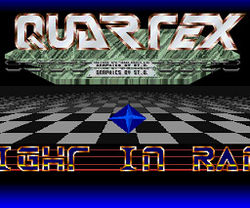
A crack intro, also known as a cracktro, loader, or just intro, is a small introduction sequence added to cracked software. It aims to inform the user which "cracking crew" or individual cracker removed the software's copy protection and distributed the crack.

The demoscene is an international computer art subculture focused on producing demos: self-contained, sometimes extremely small, computer programs that produce audiovisual presentations. The purpose of a demo is to show off programming, visual art, and musical skills. Demos and other demoscene productions are shared at festivals known as demoparties, voted on by those who attend and released online.
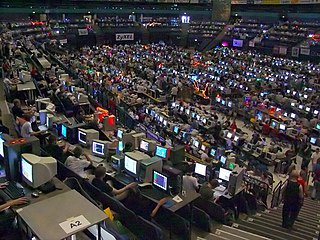
The Assembly demoparty is a demoscene and gaming event in Finland. It is the biggest demoscene party. The main organizers of the event are Pekka Aakko and Jussi Laakkonen. The Summer event takes place every year between late July and early August, and lasts three to four days, and the Winter event is held in January or February. Edition 2020 was online. The most recent Assembly was held from 1 to 3 April 2022 at Messukeskus in Helsinki.

The Commodore Plus/4 is a home computer released by Commodore International in 1984. The "Plus/4" name refers to the four-application ROM resident office suite ; it was billed as "the productivity computer with software built-in."

The Commodore 64 (C64) demos are demonstrations of what can be done to push the limits of the Commodore 64 computer, made by programmers, musicians and artists.

Second Reality is an IBM PC compatible demo created by Future Crew. It debuted at the Assembly 1993 demoparty on July 30, 1993, where it was entered into the PC demo competition, and finished in first place with its demonstration of 2D and 3D computer graphics rendering. The demo was released to the public in October 1993. It is considered to be one of the best demos created during the early 1990s on the PC; in 1999 Slashdot voted it one of the "Top 10 Hacks of All Time". Its source code was released in a GitHub repository as public domain software using the Unlicense on the 20th anniversary of the release on 1 August 2013.
Tristar and Red Sector Incorporated (TRSI) is a demogroup which formed in 1990. It came about from the longest-running cooperation in scene history. RSI existed from 1985, before being joined by the "T" later on. Evolving from the Commodore 64 to the Amiga and later to PC and various game console platforms - like the PlayStation, Xbox, Nintendo - and set-ups like Arduino, Android or Blu-ray, TRSI released a number of digital productions, dedicated to experimenting in phreaking or network alteration. Its members were spread around the world and still contribute to computer scene art and code after more than 27 years of history.
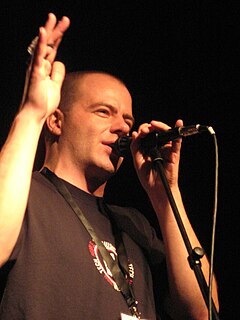
Jeroen Godfried Tel, also known as WAVE, is a Dutch composer. He is best known for numerous computer game tunes he wrote in the 1980s and early 1990s for the Commodore 64. His most popular compositions appear in the following Commodore 64 games: Combat Crazy, Cybernoid, Cybernoid II, Dan Dare 3, Eliminator, Hawkeye, Myth: History in the Making, Nighthunter, Robocop 3, Rubicon, and Supremacy.

PARADOX (PDX) is a warez–demogroup; an anonymous group of software engineers that devise ways to defeat software and video game licensing protections, a process known as cracking, which is illegal in most jurisdictions. They distribute cracks, keygens, and pre-cracked versions of entire programs. Over the years, distribution methods have changed, starting out with physically transported floppy disks and BBS distribution. Today most of their files reach the public over various peer-to-peer file networks.
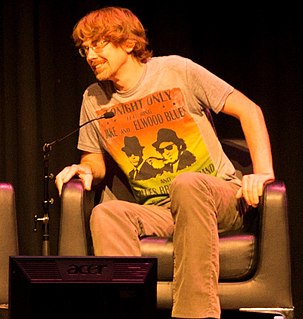
Jesper Kyd Jakobson is a Danish composer and sound designer who has worked on various video game, television, and film projects. He has composed soundtracks for the Hitman series, Assassin's Creed series, Borderlands series, Darksiders II and State of Decay, among many others. His scores use orchestra, choir, acoustic manipulations and electronic soundscapes.
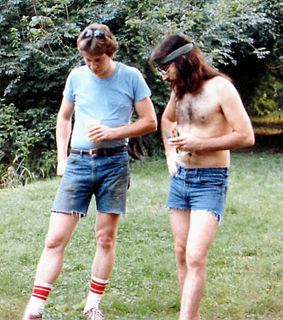
Bil Herd is a computer engineer who created several designs for 8-bit home computers while working for Commodore Business Machines in the early to mid-1980s.
Charles Deenen, is a Dutch computer/video game audio director, music composer, sound designer, and mixer. He is also known for his music and sound efforts for games of the C64 and Amiga era. He was one of the first demosceners.
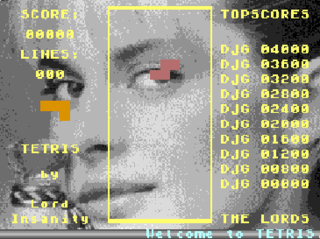
The Lords was a Dutch ZX Spectrum group from Roosendaal known as one of the earliest dedicated demogroups. The Lords released several demos for the ZX Spectrum home computer between the years 1986 and 1990. Groups such as The Lords are regarded as early pioneers of what came to be known as the demoscene. They were especially noted for their sound-chip skills.
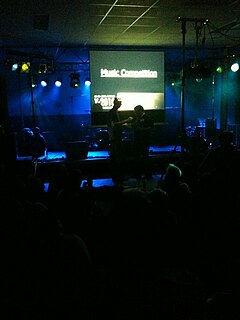
X is a Dutch demoscene party held in Someren, organized by the demoscene groups Success & The Ruling Company (SCS*TRC), Xenon, and Silicon Ltd. With about 250 visitors, it is the world's largest Commodore 64 demoscene party, attracting demosceners from around the world.
The Exceptions were a German demo group formed in the 1980s. They were early pioneers writing demos for the Atari ST platform.

Scene World Magazine is a disk magazine for the Commodore 64 home computer. The magazine has been released regularly since February 2001.

"Bad Apple!!" is the sixth track in the soundtrack of the 1998 bullet hell video game Lotus Land Story, the fourth entry in the Touhou Project series created by Team Shanghai Alice. The instrumental theme was originally designed to be played during the third stage of the game, as chiptune on the Japanese NEC PC-9800 computer platform, at 161 beats per minute using a frequency modulation synthesis chip.

Judge Dredd is a platform shoot 'em up video game based on the character of the same name. It was developed by Beam Software and published by Melbourne House. It was released in Europe in 1986, for Commodore 64 and ZX Spectrum.